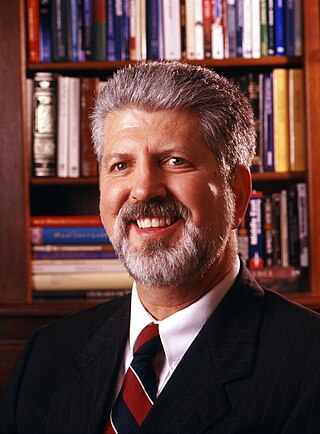Related Research Articles

Borderline personality disorder (BPD), also known as emotionally unstable personality disorder (EUPD), is a personality disorder characterized by a pervasive, long-term pattern of significant interpersonal relationship instability, a distorted sense of self, and intense emotional responses. Individuals diagnosed with BPD frequently exhibit self-harming behaviours and engage in risky activities, primarily due to challenges in regulating emotional states to a healthy, stable baseline. Symptoms such as dissociation, a pervasive sense of emptiness, and an acute fear of abandonment are prevalent among those affected.

Narcissistic personality disorder (NPD) is a personality disorder characterized by a life-long pattern of exaggerated feelings of self-importance, an excessive need for admiration, and a diminished ability to empathize with other people's feelings. Narcissistic personality disorder is one of the sub-types of the broader category known as personality disorders. It is often comorbid with other mental disorders and associated with significant functional impairment and psychosocial disability.
Antisocial personality disorder, sometimes referred to as dissocial personality disorder, is a personality disorder characterized by a limited capacity for empathy and a long-term pattern of disregard for or violation of the rights of others. Other notable symptoms include impulsivity, reckless behavior, a lack of remorse after hurting others, deceitfulness, irresponsibility, and aggressive behavior.

Heather A. Berlin is an American neuroscientist and licensed clinical psychologist noted for her work in science communication and science outreach. Her research focuses on brain-behavior relationships affecting the prevention and treatment of impulsive and compulsive psychiatric disorders. She is also interested in the neural basis of consciousness, dynamic unconscious processes, and creativity. Berlin is host of the PBS Nova series Your Brain, the PBS series Science Goes to the Movies, the Discovery Channel series Superhuman Showdown, and StarTalk All-Stars with Neil DeGrasse Tyson.
Malignant narcissism is a psychological syndrome comprising a mix of narcissism, antisocial behavior, sadism, and a paranoid outlook on life. Malignant narcissism is not a diagnostic category defined in the Diagnostic and Statistical Manual of Mental Disorders (DSM-IV-TR). Rather, it is a subcategory of narcissistic personality disorder (NPD) which could also include traits of antisocial personality disorder, paranoid personality disorder and sadistic personality disorder.
Marsha M. Linehan is an American psychologist and author. She is the creator of dialectical behavior therapy (DBT), a type of psychotherapy that combines cognitive restructuring with acceptance, mindfulness, and shaping.
James F. Masterson was a prominent American psychiatrist.
Glen Owens Gabbard is an American psychiatrist known for authoring professional teaching texts for the field. He is Clinical Professor of Psychiatry at Baylor College of Medicine in Houston, Texas, and is also training and supervising analyst at the Center for Psychoanalytic Studies in Houston.

Claude Robert Cloninger is an American psychiatrist and geneticist noted for his research on the biological, psychological, social, and spiritual foundation of both mental health and mental illness. He previously held the Wallace Renard Professorship of Psychiatry, and served as professor of psychology and genetics, as well as director of the Sansone Family Center for Well-Being at Washington University in St. Louis. Cloninger is a member of the evolutionary, neuroscience, and statistical genetics programs of the Division of Biology and Biomedical Sciences at Washington University, and is recognized as an expert clinician in the treatment of general psychopathology, substance dependence, and personality disorders. Dr. Cloninger is currently professor emeritus.
Personality disorders (PD) are a class of mental disorders characterized by enduring maladaptive patterns of behavior, cognition, and inner experience, exhibited across many contexts and deviating from those accepted by the individual's culture. These patterns develop early, are inflexible, and are associated with significant distress or disability. The definitions vary by source and remain a matter of controversy. Official criteria for diagnosing personality disorders are listed in the sixth chapter of the International Classification of Diseases (ICD) and in the American Psychiatric Association's Diagnostic and Statistical Manual of Mental Disorders (DSM).

Lee Nelken Robins was an American professor of social science in psychiatry and a leader in psychiatric epidemiology research. She was affiliated with the Washington University in St. Louis for more than 50 years from 1954 until 2007.
Donald Jay Cohen was an American psychiatrist, psychoanalyst, and director of the Yale Child Study Center and the Sterling Professor of Child Psychiatry, Pediatrics and Psychology at the Yale School of Medicine. According to the New York Times, he was "known for his scientific work, including fundamental contributions to the understanding of autism, Tourette's syndrome and other illnesses, and for his leadership in bringing together the biological and the psychological approaches to understanding psychiatric disorders in childhood"; his work "reshaped the field of child psychiatry". He was also known as an advocate for social policy, and for his work to promote the interests of children exposed to violence and trauma.
Psychopathy, from psych and pathy, was coined by German psychiatrists in the 19th century and originally just meant what would today be called mental disorder, the study of which is still known as psychopathology. By the turn of the century 'psychopathic inferiority' referred to the type of mental disorder that might now be termed personality disorder, along with a wide variety of other conditions now otherwise classified. Through the early 20th century this and other terms such as 'constitutional (inborn) psychopaths' or 'psychopathic personalities', were used very broadly to cover anyone who violated legal or moral expectations or was considered inherently socially undesirable in some way.
The Massachusetts Council on Gaming and Health is a private, non-profit health agency that was founded in 1983. It provides information, promotes public awareness, and offers community education, professional training, advocacy and referral services for problem gamblers, their loved ones, and the greater community.
Colin A. Ross is a Canadian psychiatrist and former president of the International Society for the Study of Trauma and Dissociation from 1993 to 1994. There is controversy about his methods and claims, which include recovering memories through hypnosis of Satanic ritual abuse.

David Kennedy Henderson FRSE FRCPE was a Scottish physician and psychiatrist and served as president of the Royal College of Physicians of Edinburgh 1949 to 1951.

Eric M. Plakun is an American psychiatrist, psychoanalyst, researcher and forensic psychiatrist. He is the current medical director/CEO at the Austen Riggs Center in Stockbridge, Massachusetts. Plakun's primary interests include the mental health advocacy, full implementation of the mental health parity law, access-to-care issues, and reducing health disparities; the value of and evidence base for psychosocial treatments and the diagnosis, treatment, longitudinal course and outcome of patients with borderline personality disorder and treatment resistant disorders.
Theodore P. Beauchaine is an American psychologist. His research focuses on neural bases of behavioral impulsivity, emotion dysregulation, and self-injurious behavior, and how these neural vulnerabilities interact with environmental risk factors across development for both boys and girls. He is among the first psychologists to specify how impulsivity, expressed early in life as ADHD, follows different developmental trajectories across the lifespan for boys vs. girls who are exposed to adversity. In contexts of maltreatment, deviant peer affiliations, and other environment risk factors, boys with ADHD are more likely to develop conduct problems, substance use disorders, and antisocial traits, whereas girls with ADHD are more likely to engage in self-injurious behavior and develop borderline traits. In protective environments, these outcomes are far less likely. Beauchaine has received two awards from the American Psychological Association: the Distinguished Scientific Award for an Early Career Contribution to Psychology and the Mid-Career Award for Outstanding Contributions to Benefit Children, Youth, and Families.
Andrew E. Skodol is a professor of psychiatry at the University of Arizona and Columbia University. Skodol is a member of the American Psychiatric Association, American College of Psychiatrists, and the World Psychiatric Association. He was also the President of the Association for Research on Personality Disorders and, in 2017, the American Psychopathological Association. He graduated from Yale University and the University of Pennsylvania. Skodol received his psychiatric training at the Albert Einstein College of Medicine, where he worked as an assistant professor until 1979, when he transferred to Columbia. Becoming a professor of Clinical Psychiatry from 1995 to 2007. From 2007 to 2008 he was the president of the Institute for Mental Health Research, and from 2008 to 2011 he helmed the Sunbelt Collaborative. Skodol helped write the DSM-5 and served as the chair for its work group on personality and Personality Disorders. While writing the DSM-5 he argued for the removal of Narcissistic personality disorder. From 2000 to 2003 he was the deputy director of the New York State Psychiatric Institute. He also is the chair of the Collaborative Longitudinal Personality Disorders Study. With his research primarily focused on diagnosis, stress and psychosocial functioning, Borderline personality disorder, Avoidant personality disorder, Major depressive disorder, Schizotypal personality disorder, Schizophrenia, and personality disorders. Skodol also worked to identify differing levels of severity amongst personality disorders, new personality disorder traits, new types of personality disorders, and new general personality disorder criteria.
William B. Lawson is an American professor, psychiatrist and a Distinguished Life Fellow of the American Psychiatric Association (DLFAPA).
References
- ↑ "Black, Donald W., 1956-". Library of Congress Name Authority File. Retrieved 2020-02-17.
- ↑ "Donald Black". University of Iowa. Retrieved 2020-02-17.
- 1 2 3 "Donald W. Black, MD". AACP. Retrieved 17 February 2020.
- ↑ "Psychiatrist to study pathological gamblers". Las Vegas Sun. 2000-09-18. Retrieved 2020-02-17.
- ↑ "NCRG HONORS DONALD W. BLACK WITH 2016 SCIENTIFIC ACHIEVEMENT AWARD". ICRG. 2016-09-22. Retrieved 2020-02-17.
- 1 2 "Donald W. Black, MD". Global Academy for Medical Education. Retrieved 2 July 2021.
- ↑ "EDITOR – AACP" . Retrieved 2023-06-12.
- ↑ Saeed, Ahmed; Black, Donald W. (July 2019). "Career Choices: Academic psychiatry". Current Psychiatry. Retrieved 2 July 2021.